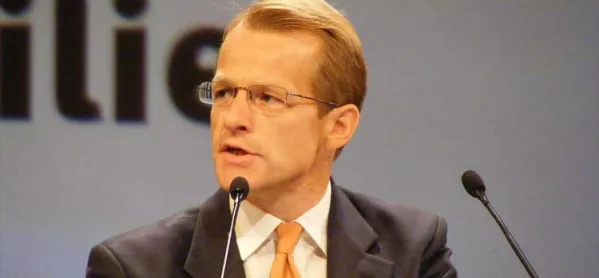- Home
- David Laws: Government would struggle to drop funding formula
David Laws: Government would struggle to drop funding formula

The government will find it “difficult” to drop its proposed national funding formula (NFF), the former schools minister David Laws has said.
Even though the Conservatives have lost the Parliamentary majority thought necessary to comfortably carry through the controversial policy, Mr Laws said they would still find it hard to abandon the formula completely.
However, Russell Hobby, the general secretary of the NAHT heads’ union, said he expected the plans to be ditched.
A new NFF for schools was outlined by education secretary Justine Greening in December, aimed at ironing out funding discrepancies between schools in different parts of the country.
However, the policy provoked controversy - including among Conservative MPs - because 9,128 schools were set to lose out under the formula, and most of those standing to benefit were likely to see their increased income outweighed by real-terms funding cuts in future years.
Mr Laws was a Liberal Democrat schools minister in the coalition government, and also held the position of chief secretary to the Treasury for 17 days. He is now executive chairman of the Education Policy Institute thinktank.
Speaking at the NAHT’s School Business Management Conference in Birmingham today, he said that even though the Conservatives saw their majority slashed in the election, he suspected the government would still try to implement the NFF in some form.
“In my view it is going to be quite difficult for the government to go back on this,” he said.
“It is true that governments have been saying that the school funding system isn’t fair and they’ve been delayed making big decisions on it… but we have now been waiting for this new NFF for so long that it really seems to me that it’s difficult to simply cancel it and indicate that there are going to be no changes made at any time over the next few years.
“Now that the government has actually published its figures to show the areas of the country that are underfunded, it’s very difficult to argue not to move forward.”
Mr Laws said he thought the Conservatives’ manifesto pledge that no school would lose out under the formula would not be enough to see the policy through, and that the government would have to offer additional money to historically underfunded rural areas to win the support of its backbenchers.
“In a situation where the government now has no majority of its own MPs, I think that it’s almost certain that government backbenchers will insist that if a NFF is introduced that some of those low funded areas, often represented by the Conservative Party in Parliament, will actually have to do a lot better,” he said.
Mr Laws said Theresa May’s failure to win a majority had resulted in “power and influence” leaking from the prime minister to the Department for Education. He advised Ms Greening to bid for enough money from Downing Street and the Treasury to ensure per pupil funding is protected in real terms as a quid pro quo for pushing funding reform through.
However, Mr Hobby - also speaking at the conference - said he was sceptical that the government would be able to implement the NFF.
“My guess would be that we won’t get a funding formula at all,” he said. “That’s a dangerous prediction but I think that it will be canned.”
Mr Hobby said that if the NFF was implemented it would be delayed for several years and would be a “soft” formula where money continues to be channelled via local authorities rather than given directly to schools as originally envisaged by the government.
Under the government plans published last year, there would be a “soft formula” in 2018-19 before the “hard forumula” kicked in from 2019-20.
School funding was an issue that “cut through” during the election campaign, Mr Hobby said, and he predicted the government would “find some more money to put into schools… I think we will start to see the end of some of these cuts.”
However, he warned that the funding situation “may get worse before it gets better” because extra funding would “take a long time to flow through”.
“This year and next year are the crisis points in school funding where reserves run out and difficult choices have to be made,” he said.
Keep reading for just £1 per month
You've reached your limit of free articles this month. Subscribe for £1 per month for three months and get:
- Unlimited access to all Tes magazine content
- Exclusive subscriber-only stories
- Award-winning email newsletters



